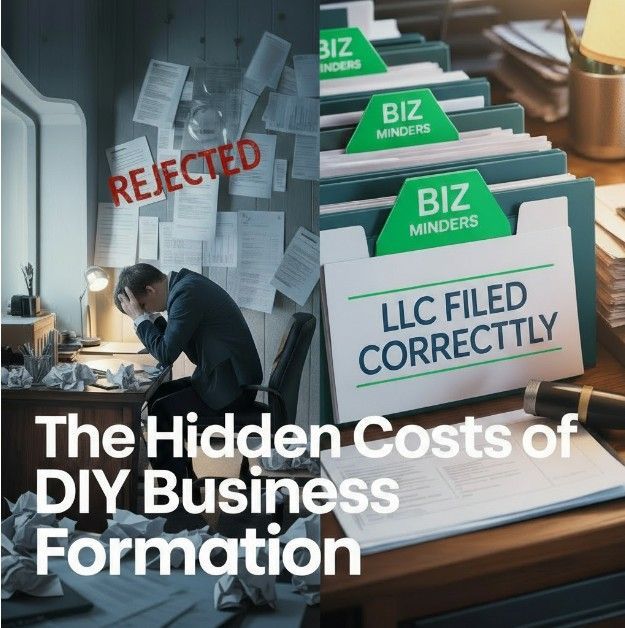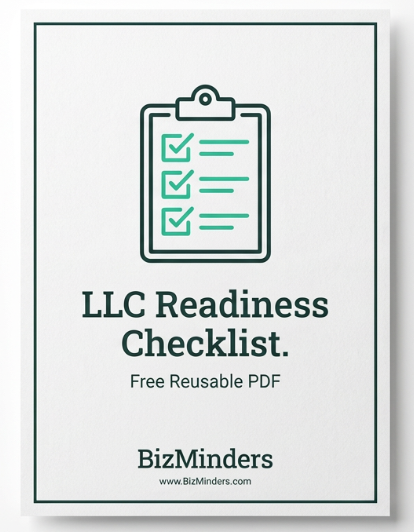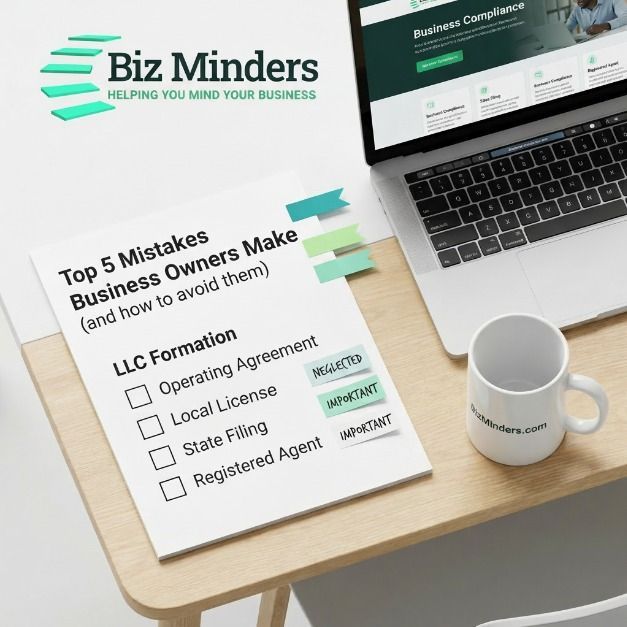The Hidden Costs of DIY Business Formation
Share this article
When “doing it yourself” costs more than doing it right

Online filing platforms make it look easy to start an LLC or corporation — a few clicks, a small fee, and your business is “official.” But what most new owners discover later is that incomplete, inaccurate, or misunderstood filings can cost hundreds or even thousands to correct — and sometimes put their entire business at risk.
At Biz Minders, we see it every week: companies formed online without the right structure, missing required filings, or unaware of their compliance obligations. Let’s break down where “DIY” often goes wrong — and how to avoid expensive mistakes before they happen.
1. Filing in the Wrong State or Entity Type
Choosing the cheapest or fastest option isn’t always the best one.
Many online services default to forming in Delaware, Nevada, or Wyoming without understanding where your real business activities occur.
If your operations or owners are based elsewhere, you may still owe
foreign qualification fees and taxes in your home state — effectively paying twice.
Correct approach: Determine your nexus (where you actually do business) before filing, and confirm whether an LLC, corporation, or partnership structure truly fits your goals.
2. Incomplete or Inaccurate Formation Documents
Most DIY platforms provide generic templates that skip critical clauses — such as succession, capital contributions, or management authority. When banks, investors, or partners request your Operating Agreement or Bylaws, these gaps can create serious issues or delays.
Correct approach: Ensure your documents match your ownership, management style, and state law. Biz Minders uses compliant, state-specific templates that stand up to both legal and banking review.
3. Ignoring Post-Formation Requirements
Filing your articles or certificate of formation is only the beginning.
To stay in good standing, you must also:
- Obtain your EIN and file the correct IRS elections (e.g., S-Corp if applicable)
- Maintain a Registered Agent
- File annual reports or renewals
- Keep accurate corporate records
DIY filers often miss one or more of these steps, resulting in late fees, penalties, or administrative dissolution.
4. Using a Home Address or Personal Contact Information
Privacy and professionalism matter.
Listing your home address on public records exposes personal information to marketers, litigants, and scammers — and once published, it’s nearly impossible to remove.
Correct approach: Use a Registered Agent service with a secure, professional mailing address. Biz Minders provides this for as little as $10 per month, with compliance reminders included.
5. No Guidance When Something Changes
What happens when you bring on a partner, open a second location, or change your business name?
DIY services can’t advise you — they only file forms. That often means multiple filings, unnecessary amendments, and time wasted fixing preventable errors.
Correct approach: Work with an experienced compliance partner who helps you adapt as your business grows — not just file paperwork once.
Peace of Mind Is Priceless
Filing your business correctly the first time is far less expensive than repairing it later.
At Biz Minders, we combine practical experience with professional compliance oversight — helping entrepreneurs form, maintain, and protect their businesses with confidence.
Ready to Form the Right Way?
Whether you’re starting fresh or cleaning up an existing entity, Biz Minders can help ensure your structure is sound, compliant, and built to last.
📌
Get started today:
Visit
BizMinders.com or email
info@BizMinders.com
to schedule your free consultation.
Disclaimer: Biz Minders is not a law firm and does not provide legal or tax advice. Information provided is for general educational purposes only. Please consult with an attorney or tax professional for advice specific to your situation.
Recent Posts







